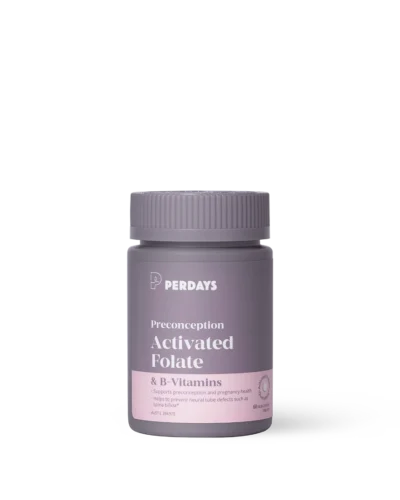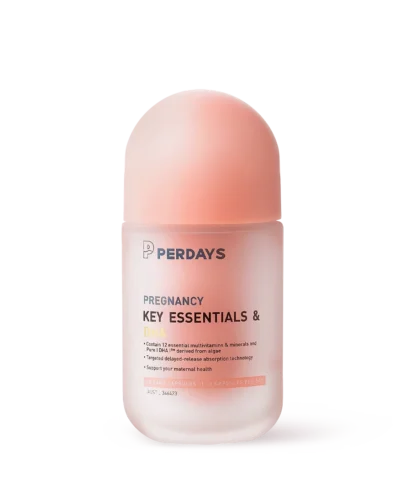By Latoya Cruz
In a Nutshell
- Prenatal supplements are recommended to support your pregnancy. Ideally, start 3 months before conception.
- Key nutrients include folic acid, Vitamin B12, and Iodine.
- DHA supplements are beneficial for baby’s brain and nervous system development, and mum’s mental health.
- Vitamin D is crucial for hormonal health and baby’s development. Deficiency can lead to risks like gestational diabetes.
- A healthy diet is still essential alongside supplements.
Introduction
So you’ve just found out you’re pregnant. Now what do you do? First of all, congratulations! This is such an exciting time in your life and you shouldn’t be left feeling overwhelmed when it comes to supplementation and your growing bub’s nutrient needs. We’re here to help breakdown what’s actually needed.
In this article we discuss the top nutrients needed for first trimester, what to take, when and why.
When should I start a prenatal supplement regime?
The best time to start taking supplements to support your pregnancy is 3 months out from conception. The second-best time is the day you learn you’re pregnant.
Folate Supplements
You may be familiar with the nutrient folate or perhaps folic acid? Folic acid is the more widely known term and is highly associated with pregnancy (and for good reason). However, folic acid is the synthetic version of folate, and due to a common gene variation, 1 in 3 women have difficulty absorbing this form of the nutrient. Folate is widely known to help reduce neural tube defects in growing babies and its consumption is often encouraged by doctors as soon as a pregnancy is detected. Along with reducing the likelihood of neural tube defects, folate can also help to prevent low infant birth weight, preterm delivery and prevent stunted infant growth. It is best to start daily consumption of folate 3 months prior to conception, if not as soon as you find out you are expecting. For optimal absorption, seek a supplement containing folinic acid or activated folate.
B12 and Pregnancy
Vitamin b12 is known to support energy production and can support the mother’s mood and energy levels during a very tiring first trimester. Not only that, b12 is crucial for baby’s brain development and DNA. Research suggests that adequate vitamin b12 intake in early pregnancy has been associated with increased infant motor, language and cognitive performance in the first 40 days postpartum. It’s important to note that vegans and vegetarians are at high risk of b12 deficiencies and so, for those on plant based diets especially, it’s encouraged to supplement with b12 well before becoming pregnant.
Iodine
Consuming iodine in early pregnancy not only assists with maintaining a healthy maternal thyroid function both during and after pregnancy, it also helps to regulate the infant’s thyroid health. The need for iodine increases during early pregnancy, throughout the rest of pregnancy and whilst breastfeeding. Becoming deficient in the nutrient can not only pose a
threat for maternal thyroid disfunction, it can also increase the risk of low infant birth weight, reduced developmental scores and cretinism.
DHA Supplements
It is understood that a baby’s brain and nervous system development typically begins around week 5-6 of pregnancy, with majority of the major brain structures developing by week 16. However, baby’s brain development will continue through the entirety of the pregnancy and last into adulthood. A good omega 3 intake like a DHA supplement will help to support the foetus’ growing brain, nervous system and assist with maternal mental health. DHA is said to play a major role in preventing perinatal depression. DHA should be consumed from conception, right through to breastfeeding.
Vitamin D Needs
Vitamin D is paramount for hormonal health, particularly for female sex hormones. Studies show that vitamin d deficiency is quite common amongst women of child bearing age. Women are encouraged to consume vitamin d heading into pregnancy, to assist with the conception and development of the pregnancy. Low maternal vitamin d levels can lead to high risks of gestational diabetes, pre-eclampsia, preterm birth and low birth weight. Vitamin d is also vital for the absorption of calcium, aiding in bone health. Vitamin d will need to be monitored as the pregnancy progresses as pregnant women are at high risk of deficiency, due to their baby’s needs and demands for the nutrient increasing. Vitamin d is best consumed minimum 3 months prior to pregnancy and throughout the pregnancy to sustain optimal levels.
Summary
Whilst navigating your first trimester can be quite overwhelming, ensuring you take a good prenatal supplement that contains folate, b12 and iodine as well as a DHA and choline supplement will help set you up for a healthy pregnancy. You may like to work with your healthcare professional and have a blood test done during first trimester to ensure you are not low or deficient in nutrients like iron and vitamin d. Whilst supplementation is encouraged during pregnancy, it should not replace a healthy and balanced diet during this exciting time.
Looking for a folate prenatal that all women can absorb?
Perdays Preconception Activated Folate with B Vitamins is specially formulated for mums who prefer or require activated folate to support their preconception and pregnancy health.
Looking For a Pregnancy Multivitamin with DHA?
Perdays Pregnancy Key Essentials & DHA Perdays is designed to work synergistically to support your preconception and prenatal health, thanks to our patented Nutriseal™ encapsulation technology. This pregnancy multivitamin contains a precise combination of 12 essential prenatal vitamins & minerals with algae-derived DHA and Folinic Acid to be absorbed by all women.

Latoya Cruz is a qualified nutritionist, registered with the Australian Traditional Medicine Society (ATMS). Latoya has an interest in women’s health including fertility, pre and postnatal, hormonal health and supporting busy, burnt out mums.
References
- https://pubmed.ncbi.nlm.nih.gov/10799405/
- https://pubmed.ncbi.nlm.nih.gov/30570998/
- https://ods.od.nih.gov/factsheets/VitaminB12-HealthProfessional/
- https://pubmed.ncbi.nlm.nih.gov/36986259/
- https://pubmed.ncbi.nlm.nih.gov/27198746/
- https://www.ncbi.nlm.nih.gov/books/NBK582659/
- https://www.ncbi.nlm.nih.gov/pmc/articles/PMC3046737/
- https://www.abs.gov.au/articles/vitamin-d/
- https://www.ncbi.nlm.nih.gov/pmc/articles/PMC8081388/
- https://www.cochranelibrary.com/cdsr/doi/10.1002/14651858.CD008873.pub4/



